
The Marine Stewardship Council has announced new measures to combat forced and child labour in the global seafood industry for its certified members.
A key requisite for the not-for-profit organisation’s updated Chain of Custody standards will require seafood suppliers and processors to conduct independent audits within their supply chains to determine if there is a risk of forced or child labour practises.

Discover B2B Marketing That Performs
Combine business intelligence and editorial excellence to reach engaged professionals across 36 leading media platforms.
Headquartered in London, the Marine Stewardship Council (MSC) awards its blue label to seafood producers to demonstrate sustainably-sourced fishing and traceability in the supply chain. It says more than 4,500 seafood companies and subcontractors in around 45,000 sites across 100 countries are certified to handle seafood for sale with the MSC and/or Aquaculture Stewardship Council (ASC) labels.
In a statement issued yesterday (28 March), the organisation said “all MSC Chain of Custody certificate holders will be required to undergo an independent labour audit unless they can demonstrate that they are at ‘lower risk’ of practising forced or child labour”.
All auditors must apply the updated MSC Chain of Custody Standard from the 28 September. For organisations that already hold an MSC certificate, the new standard must be applied at the first audit after that date with a 12-month grace period to put in place a labour audit.
Dr Yemi Oloruntuyi, head of accessibility at the MSC, said: “Around the world, more than 150 million children and 25 million adults are involved in forced labour. We recognise the urgency in addressing forced and child labour violations and have put measures in place to tackle this issue in the supply chain for certified seafood. This update to our supply chain requirements will provide seafood buyers and consumers with greater assurances that companies involved in processing and packing MSC- and ASC-certified seafood do not employ forced or child labour.”

US Tariffs are shifting - will you react or anticipate?
Don’t let policy changes catch you off guard. Stay proactive with real-time data and expert analysis.
By GlobalDataMSC said to determine if an audit is necessary a supply chain company will be assessed to see what level of risk there is of labour violations occurring during processing, packing or repacking, and manual offloading in the country or countries they operate in. If a country is considered of lower risk, according to two or more indicators, then the site does not require a labour audit.
Those indicators include: “the Country Risk Assessment Process for SA8000; an International Trade Union Confederation Global Rights Index; Ratification of five or more UN conventions on forced or child labour, human trafficking or seafood/fishing; or a US Department of Labor List of Goods made with incidence of forced or child labour.”
Certified companies that fail to address “identified” labour violations within 30 days will have their MSC certificates suspended.
The MSC statement added: “The measures follow a commitment made in 2014 by the MSC Board to include a clear policy on forced labour within MSC certification requirements and a decision in 2016 to hold extensive stakeholder consultations on labour requirements within the MSC program.”





